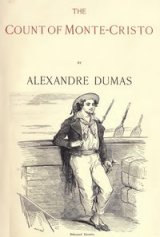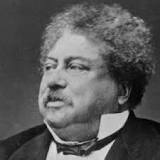The Count of Monte Cristo Page #7
The Count of Monte Cristo is an adventure novel by French author Alexandre Dumas completed in 1844. It is one of the author's most popular works, along with The Three Musketeers.
And at these words the young girl fixed her imperious look on the Catalan, who, as if fascinated by it, came slowly towards Edmond, and offered him his hand. His hatred, like a powerless though furious wave, was broken against the strong ascendancy which Mercédès exercised over him. Scarcely, however, had he touched Edmond’s hand when he felt he had done all he could do, and rushed hastily out of the house. “Oh,” he exclaimed, running furiously and tearing his hair—“Oh, who will deliver me from this man? Wretched—wretched that I am!” “Hallo, Catalan! Hallo, Fernand! where are you running to?” exclaimed a voice. The young man stopped suddenly, looked around him, and perceived Caderousse sitting at table with Danglars, under an arbor. “Well”, said Caderousse, “why don’t you come? Are you really in such a hurry that you have no time to pass the time of day with your friends?” “Particularly when they have still a full bottle before them,” added Danglars. Fernand looked at them both with a stupefied air, but did not say a word. “He seems besotted,” said Danglars, pushing Caderousse with his knee. “Are we mistaken, and is Dantès triumphant in spite of all we have believed?” “Why, we must inquire into that,” was Caderousse’s reply; and turning towards the young man, said, “Well, Catalan, can’t you make up your mind?” Fernand wiped away the perspiration steaming from his brow, and slowly entered the arbor, whose shade seemed to restore somewhat of calmness to his senses, and whose coolness somewhat of refreshment to his exhausted body. “Good-day,” said he. “You called me, didn’t you?” And he fell, rather than sat down, on one of the seats which surrounded the table. “I called you because you were running like a madman, and I was afraid you would throw yourself into the sea,” said Caderousse, laughing. “Why, when a man has friends, they are not only to offer him a glass of wine, but, moreover, to prevent his swallowing three or four pints of water unnecessarily!” Fernand gave a groan, which resembled a sob, and dropped his head into his hands, his elbows leaning on the table. “Well, Fernand, I must say,” said Caderousse, beginning the conversation, with that brutality of the common people in which curiosity destroys all diplomacy, “you look uncommonly like a rejected lover;” and he burst into a hoarse laugh. “Bah!” said Danglars, “a lad of his make was not born to be unhappy in love. You are laughing at him, Caderousse.” “No,” he replied, “only hark how he sighs! Come, come, Fernand,” said Caderousse, “hold up your head, and answer us. It’s not polite not to reply to friends who ask news of your health.” “My health is well enough,” said Fernand, clenching his hands without raising his head. “Ah, you see, Danglars,” said Caderousse, winking at his friend, “this is how it is; Fernand, whom you see here, is a good and brave Catalan, one of the best fishermen in Marseilles, and he is in love with a very fine girl, named Mercédès; but it appears, unfortunately, that the fine girl is in love with the mate of the Pharaon; and as the Pharaon arrived today—why, you understand!” “No; I do not understand,” said Danglars. “Poor Fernand has been dismissed,” continued Caderousse. “Well, and what then?” said Fernand, lifting up his head, and looking at Caderousse like a man who looks for someone on whom to vent his anger; “Mercédès is not accountable to any person, is she? Is she not free to love whomsoever she will?” “Oh, if you take it in that sense,” said Caderousse, “it is another thing. But I thought you were a Catalan, and they told me the Catalans were not men to allow themselves to be supplanted by a rival. It was even told me that Fernand, especially, was terrible in his vengeance.” Fernand smiled piteously. “A lover is never terrible,” he said. “Poor fellow!” remarked Danglars, affecting to pity the young man from the bottom of his heart. “Why, you see, he did not expect to see Dantès return so suddenly—he thought he was dead, perhaps; or perchance faithless! These things always come on us more severely when they come suddenly.” “Ah, ma foi, under any circumstances!” said Caderousse, who drank as he spoke, and on whom the fumes of the wine began to take effect,—“under any circumstances Fernand is not the only person put out by the fortunate arrival of Dantès; is he, Danglars?” “No, you are right—and I should say that would bring him ill-luck.” “Well, never mind,” answered Caderousse, pouring out a glass of wine for Fernand, and filling his own for the eighth or ninth time, while Danglars had merely sipped his. “Never mind—in the meantime he marries Mercédès—the lovely Mercédès—at least he returns to do that.” During this time Danglars fixed his piercing glance on the young man, on whose heart Caderousse’s words fell like molten lead. “And when is the wedding to be?” he asked. “Oh, it is not yet fixed!” murmured Fernand. “No, but it will be,” said Caderousse, “as surely as Dantès will be captain of the Pharaon—eh, Danglars?” Danglars shuddered at this unexpected attack, and turned to Caderousse, whose countenance he scrutinized, to try and detect whether the blow was premeditated; but he read nothing but envy in a countenance already rendered brutal and stupid by drunkenness. “Well,” said he, filling the glasses, “let us drink to Captain Edmond Dantès, husband of the beautiful Catalane!” Caderousse raised his glass to his mouth with unsteady hand, and swallowed the contents at a gulp. Fernand dashed his on the ground. “Eh, eh, eh!” stammered Caderousse. “What do I see down there by the wall, in the direction of the Catalans? Look, Fernand, your eyes are better than mine. I believe I see double. You know wine is a deceiver; but I should say it was two lovers walking side by side, and hand in hand. Heaven forgive me, they do not know that we can see them, and they are actually embracing!” Danglars did not lose one pang that Fernand endured. “Do you know them, Fernand?” he said. “Yes,” was the reply, in a low voice. “It is Edmond and Mercédès!” “Ah, see there, now!” said Caderousse; “and I did not recognize them! Hallo, Dantès! hello, lovely damsel! Come this way, and let us know when the wedding is to be, for Fernand here is so obstinate he will not tell us.” “Hold your tongue, will you?” said Danglars, pretending to restrain Caderousse, who, with the tenacity of drunkards, leaned out of the arbor. “Try to stand upright, and let the lovers make love without interruption. See, look at Fernand, and follow his example; he is well- behaved!” 0051m Fernand, probably excited beyond bearing, pricked by Danglars, as the bull is by the bandilleros, was about to rush out; for he had risen from his seat, and seemed to be collecting himself to dash headlong upon his rival, when Mercédès, smiling and graceful, lifted up her lovely head, and looked at them with her clear and bright eyes. At this Fernand recollected her threat of dying if Edmond died, and dropped again heavily on his seat. Danglars looked at the two men, one after the other, the one brutalized by liquor, the other overwhelmed with love.
Translation
Translate and read this book in other languages:
Select another language:
- - Select -
- 简体中文 (Chinese - Simplified)
- 繁體中文 (Chinese - Traditional)
- Español (Spanish)
- Esperanto (Esperanto)
- 日本語 (Japanese)
- Português (Portuguese)
- Deutsch (German)
- العربية (Arabic)
- Français (French)
- Русский (Russian)
- ಕನ್ನಡ (Kannada)
- 한국어 (Korean)
- עברית (Hebrew)
- Gaeilge (Irish)
- Українська (Ukrainian)
- اردو (Urdu)
- Magyar (Hungarian)
- मानक हिन्दी (Hindi)
- Indonesia (Indonesian)
- Italiano (Italian)
- தமிழ் (Tamil)
- Türkçe (Turkish)
- తెలుగు (Telugu)
- ภาษาไทย (Thai)
- Tiếng Việt (Vietnamese)
- Čeština (Czech)
- Polski (Polish)
- Bahasa Indonesia (Indonesian)
- Românește (Romanian)
- Nederlands (Dutch)
- Ελληνικά (Greek)
- Latinum (Latin)
- Svenska (Swedish)
- Dansk (Danish)
- Suomi (Finnish)
- فارسی (Persian)
- ייִדיש (Yiddish)
- հայերեն (Armenian)
- Norsk (Norwegian)
- English (English)
Citation
Use the citation below to add this book to your bibliography:
Style:MLAChicagoAPA
"The Count of Monte Cristo Books." Literature.com. STANDS4 LLC, 2024. Web. 24 Nov. 2024. <https://www.literature.com/book/the_count_of_monte_cristo_34>.




Discuss this The Count of Monte Cristo book with the community:
Report Comment
We're doing our best to make sure our content is useful, accurate and safe.
If by any chance you spot an inappropriate comment while navigating through our website please use this form to let us know, and we'll take care of it shortly.
Attachment
You need to be logged in to favorite.
Log In